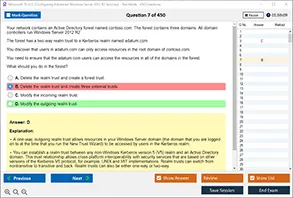Introduction to Azure Architect Role
An Azure Architect is a senior-level cloud professional responsible for designing, implementing, and managing Microsoft Azure solutions. They ensure that cloud infrastructures are scalable, secure, and cost-efficient while aligning with business goals.
Azure Architects must have deep expertise in:
- Cloud computing concepts
- Azure services (IaaS, PaaS, SaaS)
- Security and compliance
- DevOps and automation
- Disaster recovery and high availability
With businesses rapidly adopting Azure, the demand for certified Azure Architects is skyrocketing.
Key Responsibilities of an Azure Architect
An Azure Architect performs various critical tasks, including:
- Designing cloud solutions based on business requirements.
- Optimizing costs by selecting the right Azure services.
- Ensuring security using Azure Active Directory, RBAC, and encryption.
- Implementing disaster recovery strategies for business continuity.
- Automating deployments using ARM templates, Terraform, or Azure DevOps.
- Monitoring performance with Azure Monitor and Log Analytics.
Azure Architect Certification Path
Microsoft offers two key certifications for Azure Architects:
Microsoft Certified: Azure Solutions Architect Expert (AZ-305)
- Focuses on designing cloud and hybrid solutions.
- Requires passing AZ-104 (Azure Administrator) or equivalent knowledge.
Microsoft Certified: Azure DevOps Engineer Expert (AZ-400)
- Covers CI/CD, infrastructure as code (IaC), and automation.
These certifications validate expertise and improve job prospects.
Azure Architect Interview Questions & Answers
Azure Core Concepts
Q1: What is Microsoft Azure, and how does it differ from other cloud providers?
A: Microsoft Azure is a cloud computing platform offering IaaS, PaaS, and SaaS solutions. Unlike AWS and Google Cloud, Azure integrates seamlessly with Microsoft products like Windows Server, Active Directory, and Office 365.
Q2: Explain the difference between Azure Resource Manager (ARM) and Classic Deployment Model.
A:
Classic Deployment: Older model with limited role-based access control (RBAC).
ARM (Resource Manager): Modern approach with RBAC, tagging, and infrastructure-as-code support.
Azure Compute Services
Q3: When should you use Azure VMs vs. Azure App Services?
A:
Azure VMs: Best for full OS control, legacy apps, and custom configurations.
Azure App Services: Ideal for web apps, APIs, and serverless functions with auto-scaling.
Q4: What is Azure Kubernetes Service (AKS), and why use it?
A: AKS is a managed Kubernetes service for deploying containerized apps. Benefits include auto-scaling, security, and simplified cluster management.
Azure Networking
Q5: What is Azure Virtual Network (VNet), and how does it work?
A: VNet is a logically isolated network in Azure, allowing secure communication between VMs, apps, and on-premises systems via VPN or ExpressRoute.
Q6: Explain Azure Load Balancer vs. Application Gateway.
A:
Azure Load Balancer (Layer 4): Distributes traffic across VMs.
Application Gateway (Layer 7): Supports SSL termination, URL routing, and WAF.
Azure Storage Solutions
Q7: Compare Azure Blob Storage vs. Azure Files.
A:
Blob Storage: For unstructured data (images, logs, backups).
Azure Files: Fully managed file shares accessible via SMB/NFS.
Q8: What is Azure Cosmos DB, and when should you use it?
A: A globally distributed NoSQL database for low-latency, high-availability apps like gaming and IoT.
Security & Identity Management
Q9: How does Azure Active Directory (AD) enhance security?
A: Azure AD provides identity and access management (IAM), multi-factor authentication (MFA), and single sign-on (SSO).
Q10: What is Azure Key Vault, and why is it important?
A: A centralized cloud service for managing secrets, encryption keys, and certificates securely.
Monitoring & Disaster Recovery
Q11: How does Azure Site Recovery (ASR) work?
A: ASR replicates on-premises or Azure VMs to a secondary location for disaster recovery.
Q12: What is Azure Monitor, and what does it track?
A: A unified monitoring tool for performance metrics, logs, and alerts across Azure resources.
DevOps & Automation in Azure
Q13: Explain Infrastructure as Code (IaC) in Azure.
A: IaC automates deployments using ARM templates, Terraform, or Bicep for consistency.
Q14: What is Azure DevOps, and what services does it offer?
A: Azure DevOps provides CI/CD pipelines, Git repos, Agile boards, and test automation.
How to Prepare for Azure Architect Interviews?
- Study Azure documentation and official Microsoft Learn modules.
- Practice hands-on labs in the Azure portal.
- Review real-world case studies on cloud migrations.
- Take mock exams to test your knowledge.
Why is Dumpsarena the Best Resource for Azure Architect Exam Preparation?
Preparing for Azure Architect certification exams can be challenging, but Dumpsarena simplifies the process with:
- The latest exam dumps for AZ-305 and AZ-400 have been updated.
- Real exam-like questions with detailed explanations.
- Practice tests to assess readiness.
- Instant download access for quick preparation.
- Using Dumpsarena’s high-quality study materials increases your chances of passing the Azure Architect exams on the first attempt.
Conclusion
Becoming an Azure Architect requires deep technical knowledge and hands-on experience. By mastering core Azure services, security, and automation, you can excel in interviews and certification exams.
For the best preparation, rely on Dumpsarena’s trusted resources to ace your Azure Architect certification and land your dream cloud job.




